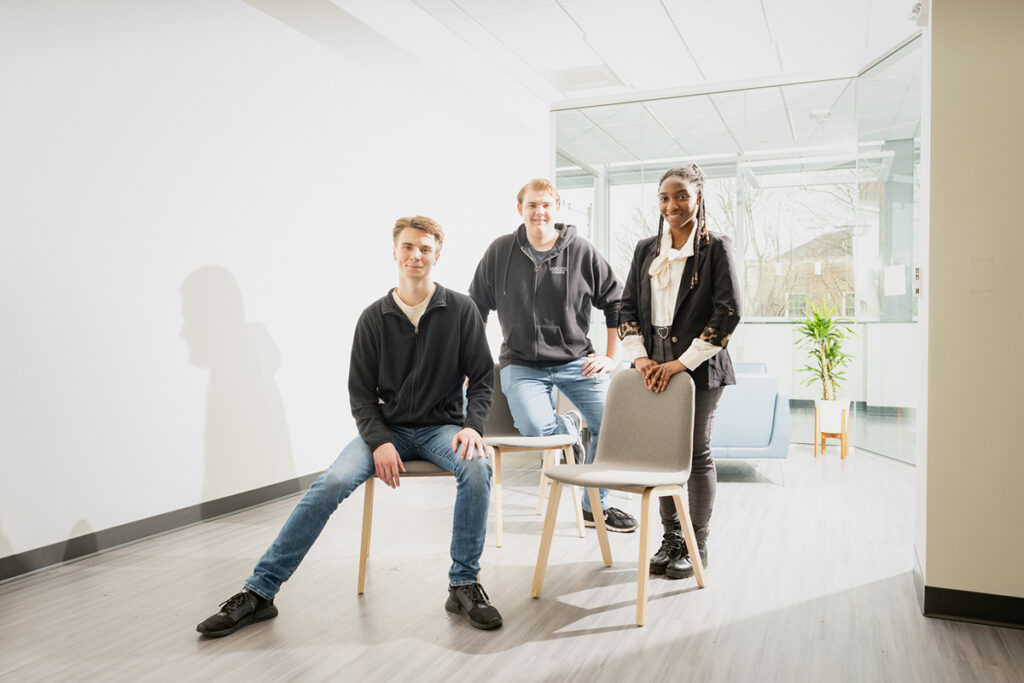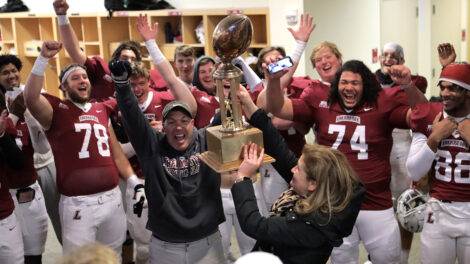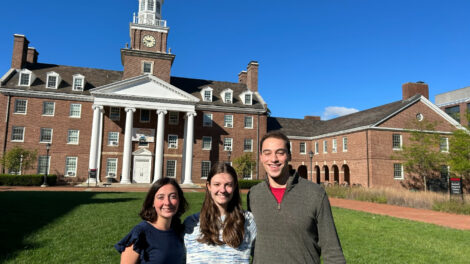Chemical and biomolecular engineering students recognized at American Institute of Chemical Engineers conference
Three Lafayette College chemical and biomolecular engineering majors received recognition for their research during the annual meeting of the American Institute of Chemical Engineers (AIChE) in Phoenix, Ariz.

(L-R): Luke Goodhope ’24, Jack Kerekes ’24, and Jelissa Kamguem ’23
Luke Goodhope ’24, Jack Kerekes ’24, and Jelissa Kamguem ’23 came home with awards for their poster presentations, a highlight of the annual gathering of chemical engineers where students present their research and refer to their posters for visual representations and context. The audience includes attendees, along with anonymous faculty who adjudicate the posters and how well the participants articulate their research.
More than 600 undergrads from across the country participated in the convention’s poster session.
“The annual AIChE meeting is a seminal conference for chemical engineers both nationally and internationally. This year we sent 17 students to the conference where they were able to learn more about the field, gain networking experience, and present their research,” says Lindsay Soh, associate professor of chemical and biomolecular engineering and department head.
“The awards earned by Jelissa, Luke, and Jack highlight the strength of their research efforts as well as their ability to clearly and effectively communicate their work and its findings,” she says. “We are proud of them and all of the students who presented their work.”
Working with Soh, with collaborative support from Melissa Gordon ’11, assistant professor of chemical and biomolecular engineering, Goodhope is working on a way to isolate a specific molecule from birch bark, which will eventually be used to create bio-based polymers. The process he has worked on, along with Rongmin Tang ’22 and Qwin Pisacane ’25, seeks to make this extraction greener and more scalable. He won a first-place award in the environmental division.
“Most of this process is done with very harsh chemicals,” Goodhope says. “My research essentially focuses on finding a way to extract this molecule out of the birch bark through environmentally sustainable methods.”
Planning for a career in the chemical engineering industry after Lafayette, he credits small class sizes, which allow students to get to know their professors, as a key reason why the Lafayette experience inspires students to take on significant research projects.
“I think our professors really saw the potential in me and Jack that we didn’t necessarily see ourselves,” Goodhope says. “They make sure that we reach our full potential through the research that we perform and the posters that we present.”
Kerekes, who also works with Soh on a related project, is planning a career in industry. He won third place in the environmental division for his work, along with Ryan Berry ’22, on using switchable solvents for betulin extraction. Switchable solvents are a novel class of solvent that can change properties based on an external trigger, allowing for potentially more selective and more sustainable processes.
“An important part of the poster presentation is the interaction with whoever you’re presenting it to,” he says. “Lafayette has a major focus on developing engineers as not only engineers and researchers but also as people who can effectively communicate. We’re not only trained to be problem-solvers but also communicators, which is very important in order to convey the importance of individual research projects.”
Kamguem, who’s also minoring in data science, is doing computational research with faculty at the Massachusetts Institute of Technology to design materials to create energy from hydrogen. She is conducting her honors thesis on this project along with Ryan Van Horn, associate professor of chemical and biomolecular engineering. Kamguem won a first-place award for her presentation in the computing and process control category, and an additional Computing and Systems Technology Directors’ Award, given for the best poster presentation in that division.
“This research is important because a lot of research has been done on trying to find more environmentally friendly energy resources,” Kamguem says. “Hydrogen is one of them, because when we burn hydrogen it gives water. And that’s not disruptive to the environment.”
The only problem with hydrogen is how to store it, she explains.
“So, I’m working on this material called metal organic frameworks,” Kamguem says. “Metal organic frameworks are very porous in nature, so they have potential to store hydrogen. Research has been shown that they are good at storing carbon dioxide and nitrogen, so I really want to see if they’re also good at storing hydrogen. All of my research is about figuring out if this material is good for storing hydrogen gas.”
She says that her Lafayette education prepared her for the intellectual rigor required for the conference.
“I was very independent in the process, because most of the people I work with are not on campus,” Kamguem says. “I talk mostly to them via Zoom. So a lot of my preparation for this poster was coming from me and using online resources. I did research on what a good poster will look like. And then I designed my poster and reviewed it thoroughly. I remember one of my professors walking into a room and giving me the much-needed validation.
“Getting the CAST award really speaks to the academic independence that’s given at Lafayette and the quality curriculum and faculty who have taught me so much,” she adds. “All of it really prepares me for grad school, which is what I want to do.”

